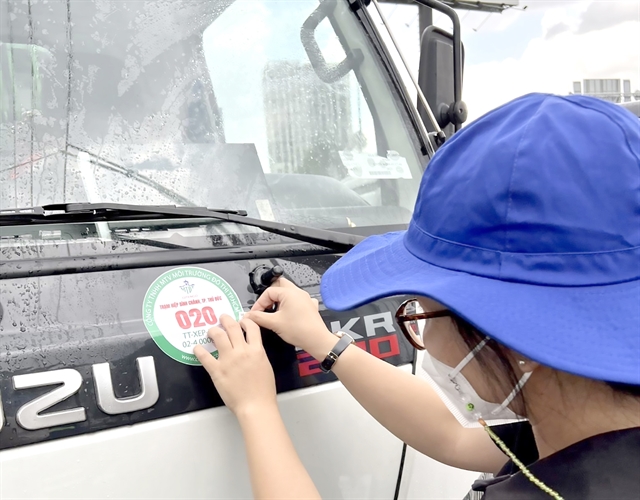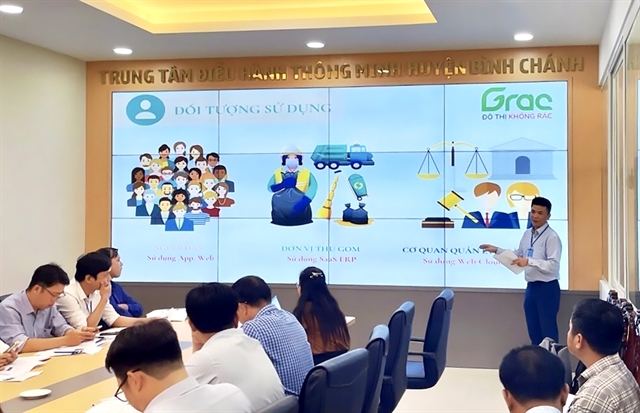 Environment
Environment

 |
| An employee of Thủ Đức City’s Public Service One Member Ltd Company stamping identification logos on its public garbage collection trucks. — VNA/VNS Photo Hồng Giang |
HCM CITY — HCM City is making efforts to promote digital transformation in the collection, treatment and management of the huge volume of domestic solid waste discharged daily.
Many experts said the application of advanced technologies of the fourth industrial revolution in waste collection, treatment and management is considered an optimal solution to upgrade the city’s waste management model, improve efficiency in domestic waste management, and save operating costs.
The city generates about 9,700 tonnes of solid waste daily with complicated composition and characteristics, putting great pressure on domestic waste management, collection, transportation and treatment units.
Shortcomings in traditional ways of domestic waste management
Domestic waste in the city increases in volume every year by six to 10 per cent, not to mention the large amount of domestic waste dumped illegally.
Therefore, collecting an increasing amount of waste creates many challenges for the people and collecting services involved in waste treatment in the city.
Around 60 per cent of garbage collection is done by private trash collectors and the rest by public service companies in the city.
Private trash collectors include 162 companies, 17 cooperatives, two trade unions and more than 2,120 people-founded garbage collection groups, mainly collecting waste from households and small waste sources in alleys.
Meanwhile, the HCM City Urban Environment One Member Ltd Company and 22 district-public service companies operating at the district level are responsible for collecting the waste gathered at waste collection points along streets and public places.
That leads to a lack of consistency in the collection and transportation of waste in the city, affecting the quality of the environment.
According to Nguyễn Trọng Minh, director of the GRAC Technology Joint Stock Company, the traditional way of solid waste management still has many limitations and problems.
The waste collection units mainly use books or excel to manage their data, which can lead to data loss and it is difficult to recover the loss.
Reporting data in this traditional way also makes their employees lose time and it is difficult to transfer work between employees.
The units also can not fully control the performance of their sanitation workers as well as measure people's satisfaction.
Fee collection by waste collection services is mainly implemented door-to-door, requiring a lot of personnel and time.
In principle, waste collection and treatment requires the participation of three parties: households, waste collection units and state management agencies. However, currently, people do not have a convenient information channel to connect with the government and functional agencies on problems related to waste collection services.
Any problem that arises will be mainly handled following the service contract signed between the household and the waste collection unit. The role of the government agency is not clear.
That makes environmental sanitation management by local State agencies not as effective as it could be.
 |
| Officials and experts in charge of the environment in HCM City’s Bình Chánh District attend a training course on how to use the Grac app to digitise waste management. — VNA/VNS Photo Hồng Giang |
Digitising waste management data
Nguyễn Trọng Minh said the application of waste management software and data digitisation would be a feasible option to help public officials at ward and commune levels to manage waste more effectively and easily.
The ‘Grac’ app developed by his company on two platforms, including web for authorities and mobile for residents, is being used by waste collectors in the city to digitise waste management.
Users can download and install this app on their iOS or Android devices to interact with the app’s waste services such as registering for waste collection, paying fees and monitoring garbage truck routes.
“Using the app helps waste collection units and cooperatives save transportation costs and support residents to classify waste correctly,” Minh said.
With an online waste market, the app allows scrap dealers and owners of waste to connect. Sellers of waste can take pictures of products they want to sell, such as paper and plastics, and post the images on the app.
Users can call scrap dealers to collect waste, give away junk to the needy, and make online payments for waste collection services.
Scrap dealers receive information from sellers and then move to the areas where sellers are. The two sides negotiate prices and make transactions.
Waste owners can post information about old items they have and want to donate.
People can also send complaints related to waste collection services directly to the ward’s People's Committee and the waste collection unit through the app.
Minh said his company was working with the authorities of districts in the city to organise a training course on how to use the Grac app for officials and experts in charge of the environment.
The app is being used by the districts of Gò Vấp, Bình Thạnh, Bình Chánh, 3, 4 and Tân Định Ward of District 1. Other districts and Thủ Đức city are implementing data digitisation so that the entire city can complete the digital transformation for domestic waste collection and management by the end of this year.
“It is expected to be used widely by not only local authorities and waste collectors but also residents by next year,” Minh said.
The company would continue to work with the districts to implement digital transformation in the management of each specific type of waste such as plastic waste, bulky waste, recycled waste and waste discharged illegally, he said.
Huỳnh Minh Nhựt, general director of the HCM City Urban Environment Company Limited (CITENCO), said his company had 265 waste collection and transportation vehicles tracked by Global Positioning System (GPS) navigation devices.
The company developed an internal mobile application to better manage garbage trucks at waste transfer stations, and check and confirm truck drivers' information, he said.
It also built a management system for monitoring waste collection and transportation at each waste transfer station, including card readers, surveillance cameras and submersible weighing systems; and a management database system for specific types of waste such as domestic waste, industrial waste or medical waste.
It used Google Forms to constantly update employees’ reports, he said.
The company, in collaboration with the city’s Department of Natural Resources and Environment and Thủ Đức City’s Public Service One Member Ltd Company, has deployed stamping logos to identify public garbage collection trucks that should be allowed into local waste transfer stations.
This model helps Thủ Đức City remotely control information about the number of trips, waste collection volume, registered plate number, and vehicle type; as well as prevent illegal dumping of domestic waste from other localities. — VNS




